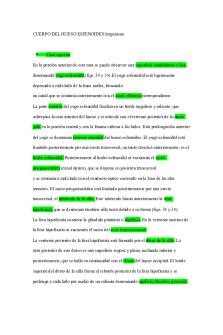Las dos caras del patroncito PDF

| Title | Las dos caras del patroncito |
|---|---|
| Author | An Santos |
| Course | Latin America Through The Arts |
| Institution | SUNY New Paltz |
| Pages | 2 |
| File Size | 58.1 KB |
| File Type | |
| Total Downloads | 58 |
| Total Views | 162 |
Summary
Latin America Through the Arts ...
Description
October 30, 2018 Las Dos Caras del Patroncito Luis Valdez was born in Delano, California and was raised by his parents who were migrant farm workers from Mexico. Valdez had experienced a lot at such a young age, at the age of 5 he began to work the fields. Throughout his childhood, his family moved from harvest to harvest around the central valleys of California. The play Las Dos Caras del Patroncito by Luis Valdez is a short play but it goes straight to the point. One may say that this play is moralistic and that it also expresses the anger of the workers. Luis Valdez decided to join the united farm worker organizing committee by Cesar Chavez where he brought together students to form El Teatro Campesino. The play is mainly about a Patroncito who rants to the farmworker about how they have it good and have no responsibilities to worry about and how lucky they are that they don't worry about money problems. The Patron continuously says to the Farmworker that he loves Mexicans and that he wishes to be one because of how easy it is for them. He laments his own riches as a burden he hated how much work and money he had to invest all his time in. On the other hand, the Farmworker is listening to him knowing how poor he is and he would be grateful to even be able to afford a car. He works in the field because he had no other option it is not like he loved working there it was forced. When the Patron started stating how much he loved Mexicans and wished to be like them because they don’t have to worry about anything I automatically thought that he was wrong for saying that. Those Mexicans in the grape field did not choose to be there and nor do they want to be there. They would have much rather be working a real job and not being told what to do by a
person who has more power than they do. The farmworker who was talking to the Patron took advantage of the Patron because he deserved it for how rude he was speaking. He was surprised with all the comments the Patron was making so he motivated him to be a farmworker for a day, so they exchanged items to make it look like they switched positions. When I say that the farmworker took advantage of the Patron is because he saw this as a chance to get justice for what he had been going through. Never would he have thought that the Patron would actually want to switch roles for a day so he pretended to be him by imitating him and treated him as if he was a “Mexican”. Towards the end of the play, the farmworker started to abuse the Patroncito by calling him a spic, all the slurs the farmworker had endured. The Patroncito screams for help to the union activist Cesar Chavez but nobody believed that he was the Patron and so they took him away but shortly after he gives everything back and just keeps the cigar. If the oppressors could put themselves in the play of the oppressed, they should see their own injustice In conclusion, people do not know what they have until it is stripped away from them. For instance, in the play, it states “You’re nuts! I can’t live in those shacks! They got rats, cockroaches. And those trucks are unsafe. You want me to get killed?” the Patroncito would rant about Mexicans have it easy and they are lucky but in reality, they didn’t they’re life was not as fortunate as he thought it would be. They were continuously taken out of one field to go to another in those trucks that he stated were “unsafe”. Since Luis Valdez has been through everything his play is about, he was very passionate about this play he relates to it on a personal level. This is a problem that should be brought up for readers to acknowledge that what he went through was real and could be happening....
Similar Free PDFs

Las dos caras del patroncito
- 2 Pages

Caras del cerebro 6 - tarea
- 2 Pages

EL- Heroe-DE-LAS-MIL- Caras
- 6 Pages

Las 5 caras de tus dientes
- 4 Pages

CARAS-R
- 7 Pages

RESEÑA DEL LIBRO WALDEN DOS
- 6 Pages
Popular Institutions
- Tinajero National High School - Annex
- Politeknik Caltex Riau
- Yokohama City University
- SGT University
- University of Al-Qadisiyah
- Divine Word College of Vigan
- Techniek College Rotterdam
- Universidade de Santiago
- Universiti Teknologi MARA Cawangan Johor Kampus Pasir Gudang
- Poltekkes Kemenkes Yogyakarta
- Baguio City National High School
- Colegio san marcos
- preparatoria uno
- Centro de Bachillerato Tecnológico Industrial y de Servicios No. 107
- Dalian Maritime University
- Quang Trung Secondary School
- Colegio Tecnológico en Informática
- Corporación Regional de Educación Superior
- Grupo CEDVA
- Dar Al Uloom University
- Centro de Estudios Preuniversitarios de la Universidad Nacional de Ingeniería
- 上智大学
- Aakash International School, Nuna Majara
- San Felipe Neri Catholic School
- Kang Chiao International School - New Taipei City
- Misamis Occidental National High School
- Institución Educativa Escuela Normal Juan Ladrilleros
- Kolehiyo ng Pantukan
- Batanes State College
- Instituto Continental
- Sekolah Menengah Kejuruan Kesehatan Kaltara (Tarakan)
- Colegio de La Inmaculada Concepcion - Cebu









